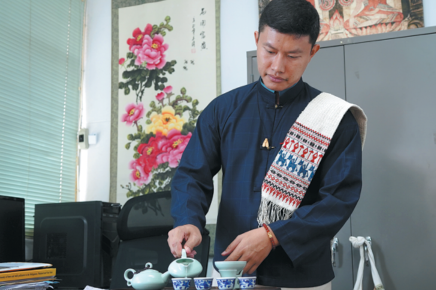Experts: US policies inhibit China scientists

Recognizing that scientific collaboration is increasingly international, and China's research capacity is at the world's forefront, scientists are concerned that the US policies targeting Chinese researchers have significantly hurt productivity.
"It is internationally collaborative networks and groups that tackle the biggest problems, like climate change, epidemiology and so on," said Jonathan Adams, chief scientist of the Institute for Scientific Information at Clarivate in England, at a conference organized by Asia Society Northern California.
"International collaboration is here to stay. China is a very, very big player now in that field," Adams said. "China's research is increasingly high-quality and innovative. It's supported by a lot of resourcing, and there are more and more important discoveries and innovations coming out of that. It would be absurd for us to cut ourselves off from what's happening there."
Adams said Chinese research is particularly important in high technology areas, and its collaborators "clearly benefit from that".
He also said China is increasingly collaborative with more countries. Take the United States, for example. He said that in areas of technology research, such as nano sciences and telecommunications, the papers co-authored by US and Chinese researchers are more numerous than the US domestic papers.
Caroline Wagner, a professor at John Glenn College of Public Affairs at Ohio State University, conducted a study and found China had surpassed the EU around 2015 and the US in 2019 in production of the top 1 percent most highly cited articles.
"These are the works that get the greatest attention from other scientific researchers," she explained. "It means China is at the forefront in terms of capacity to do world-class research."
She said cooperative work between China and the US is extremely well cited at the top levels. However, China's collaborations with the US have been dropping in past few years.
"We saw the shift down around 2018; at the same time, though, China-EU collaboration continued fairly strongly," said Wagner. She added that political implications could lead to the decreased cooperation, referring to the now-defunct "China Initiative" program that which was launched in 2018.
Her findings coincide with the research of Margaret Roberts, a professor of political science at the University of California, San Diego. She co-authored a National Bureau of Economic Research Working Paper titled The Impact of US-China Tensions on US Science.
The paper presents how the US investigations have affected the productivity in life sciences by comparing the publications of scholars who had previous collaborations with China and those who had other international collaborations.
The paper found that after the launch of the China Initiative, there was a decrease in productivity; that trend has continued.
In response to voices that calling for scrutiny of Chinese collaboration over national security or human rights concerns, Roberts said the research collaborations between the US and China are "incredibly productive", and most of those collaborations are in areas of science and focused on challenges that humanity faces.
But those highly publicized investigations of Chinese researchers have caused "a big chilling effect", she said, and "there's this perception that any type of collaboration is bad".
"I hope that there could be a lot more clarity (in US government guidance) because I think the lack of clarity around this leads to this chilling effect, and it's more likely to create implicit bias," she said.
To help restore collaboration, Adams advised the policymakers to "work out communications" with China.
"At the moment, we are not positioning ourselves in a way that optimizes our communication with China because we don't know enough about what they're doing, and that is not because they are hiding—it is because we simply aren't able to ask the right questions," he said.
"What we have to do is to address how we are going to make the best use of that relationship and the benefits it provides, rather than focusing solely on how we control and limit the information flow in the relationship, which is a very negative position to start from," said Adams.































